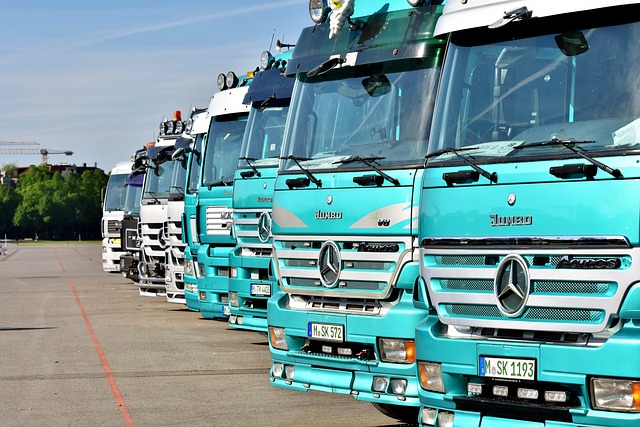Uncover Montclair’s Hidden Waste Management Treasures: Commercial Dumpsters

Montclair, NJ, offers efficient waste management through Commercial Dumpster options tailored to loc…….
Welcome to an in-depth exploration of a vital component within the waste management industry—the Commercial Dumpster in Montclair, New Jersey. This article aims to dissect and demystify this aspect of urban waste management, offering readers a comprehensive understanding of its role, evolution, and global impact. By delving into various facets, from historical context to technological advancements, we will uncover the significance of commercial dumpsters and their role in shaping sustainable practices worldwide.
Definition: A commercial dumpster, often referred to as a waste management container or roll-off vehicle, is a large, temporary storage unit used for collecting and transporting solid waste generated by businesses, construction sites, and other commercial entities. In the context of Montclair, New Jersey, these dumpsters play a pivotal role in maintaining a clean and sustainable urban environment.
Key Components:
Size and Capacity: Commercial dumpsters come in various sizes, typically ranging from 10 to 40 cubic yards, catering to different waste generation rates. In Montclair, the most common sizes include 20-yard and 30-yard roll-offs.
Material Construction: They are usually made of sturdy materials like steel or aluminum to ensure durability and resist extreme weather conditions.
Wheels and Handling: Equipped with wheels, these dumpsters can be easily rolled into place and emptied, making them highly maneuverable.
Open-Top Design: The open-top design allows for convenient loading and unloading of waste materials.
Historical Context:
The concept of commercial dumpsters has evolved over time, reflecting changes in waste management practices. In the early 20th century, waste collection was primarily handled by horse-drawn carts and manual labor. As urban populations grew, the need for more efficient waste disposal methods became apparent. The introduction of roll-off containers in the 1950s revolutionized waste management, offering a temporary storage solution that facilitated easier transportation and recycling.
The influence of commercial dumpsters extends far beyond Montclair, shaping global waste management strategies and contributing to sustainable development initiatives. Here’s an overview:
| Region | Impact and Trends |
|---|---|
| North America | The United States and Canada have long been pioneers in dumpster technology, with advanced recycling programs utilizing these containers. Recent trends include the adoption of smart sensors for real-time waste monitoring and the rise of single-stream recycling systems. |
| Europe | European cities are embracing sustainable waste management practices, with Germany leading the way in recycling rates. Commercial dumpsters are integrated into comprehensive waste collection networks, promoting efficient sorting and processing. |
| Asia Pacific | Rapid urbanization in countries like China and India presents unique challenges. Commercial dumpster usage is increasing, especially in major metropolitan areas, to manage construction waste and promote recycling initiatives. |
| Latin America | Many Latin American cities are implementing innovative waste management solutions, including the use of dumpsters for organic waste collection and composting programs. This region is witnessing a growing emphasis on sustainable waste practices. |
Global trends indicate a growing awareness of environmental sustainability, driving the adoption of more efficient waste management systems. Commercial dumpsters play a crucial role in this shift by enabling better waste segregation, recycling, and disposal practices worldwide.
The commercial dumpster market is a dynamic sector within the broader waste management industry, attracting significant investment due to its potential for profitability and positive environmental impact.
Market Size: According to recent reports, the global waste management market is valued at over $400 billion, with commercial dumpsters contributing substantially. The market is expected to grow at a CAGR of 7% during the forecast period (2022-2030), driven by rising urbanization and stringent environmental regulations.
Investment Patterns: Private equity firms and venture capitalists are increasingly targeting waste management startups, including those specializing in dumpster technology. Innovations like smart dumpsters equipped with IoT sensors are attracting investments due to their potential for data-driven waste management solutions.
Economic Impact: In Montclair and similar cities, commercial dumpsters contribute to local economies by supporting waste management services, recycling facilities, and related industries. Efficient waste collection can lead to reduced labor costs and improved public health, benefiting the overall community.
Technological innovations have transformed commercial dumpsters into smart, efficient assets, enhancing their capabilities and contributing to a more sustainable future. Here’s an overview of key advancements:
Internet of Things (IoT) Sensors: Modern dumpsters are equipped with IoT sensors that monitor fill levels, enabling real-time tracking and optimizing collection routes. This technology improves efficiency, reduces emissions from idling vehicles, and enhances data-driven decision-making.
Automated Lifting Mechanisms: Some advanced dumpsters use hydraulic or pneumatic systems for automatic lifting and lowering, making the loading process safer and faster. These mechanisms reduce manual labor requirements and potential workplace injuries.
Data Analytics and Predictive Modeling: Waste management companies utilize data analytics to predict waste generation patterns, optimize collection schedules, and identify areas for recycling improvements. This technology contributes to more sustainable practices and cost savings.
Solar-Powered Dumpsters: In line with renewable energy trends, solar panels integrated into dumpsters provide power for lighting, sensors, and other electrical components, reducing carbon footprints.
The commercial dumpster industry operates within a framework of environmental policies and regulations designed to ensure sustainable waste management practices. These guidelines vary by region but generally include:
Waste Management Plans: Local governments often require businesses and construction sites to develop comprehensive waste management plans, detailing their recycling and disposal methods, including the use of commercial dumpsters.
Permitting and Licensing: Dumpster placement and usage are regulated through permitting systems, ensuring compliance with local waste management ordinances.
Environmental Protection Act (EPA) Regulations: In the United States, EPA regulations set standards for safe handling, transport, and disposal of hazardous materials, which commercial dumpsters must adhere to.
Recycle and Disposal Rates: Many regions mandate specific recycling and disposal rates for businesses, incentivizing responsible waste management practices.
Despite its numerous benefits, the commercial dumpster system faces several challenges and criticisms that require attention and innovative solutions:
Illegal Dumping: One of the primary concerns is illegal dumping, which can occur when dumpsters are left unsecured or not properly monitored. This issue undermines sustainable efforts and poses environmental and health risks.
Noise and Traffic Disruption: The frequent movement of dumpsters and collection vehicles can lead to noise pollution and traffic congestion, especially in dense urban areas.
Landfill Overburdening: Improper waste sorting and recycling practices can contribute to landfill overburdening, negating the environmental benefits of dumpster usage.
Cost Implications: Implementing advanced technologies like IoT sensors may increase initial investment costs for businesses, potentially hindering widespread adoption.
Proposed Solutions:
New York City, a global hub of urban innovation, has implemented a comprehensive waste management strategy that includes the strategic use of commercial dumpsters. The city’s initiative focuses on organics collection and composting, aiming to reduce landfill waste. By partnering with local businesses and restaurants, NYC successfully introduced a food waste diversion program using dedicated dumpsters for organic material collection. This case highlights the potential for commercial dumpsters in promoting circular economy practices.
San Francisco has gained recognition for its sustainable construction practices, including the efficient use of commercial dumpsters. The city’s strict building codes and environmental regulations encourage developers to adopt eco-friendly methods. One notable project involved a high-rise construction site that utilized advanced dumpster systems with real-time monitoring, resulting in significant reductions in waste transportation emissions.
Portland has been at the forefront of sustainable city planning, and its community recycling programs are a prime example of successful dumpster integration. The city offers free dumpster access to local residents for various recycling needs, from household goods to construction debris. This initiative has led to increased participation in recycling efforts and reduced waste sent to landfills. Portland’s approach demonstrates the power of community engagement in fostering sustainable practices.
The future of commercial dumpsters looks promising, with emerging trends shaping the industry’s trajectory:
Smart Cities and Digital Integration: As cities embrace smart city initiatives, commercial dumpsters will play a vital role in integrating waste management data into urban infrastructure. Real-time monitoring and analytics will enable more efficient waste collection and resource allocation.
Circular Economy Focus: The circular economy concept is gaining traction globally, encouraging the reuse and recycling of materials. Commercial dumpsters can facilitate this transition by enabling better sorting and processing of recyclables, reducing the need for raw resources.
Renewable Energy Integration: With a growing emphasis on sustainability, solar-powered dumpsters and other renewable energy solutions will likely become more prevalent, contributing to carbon neutral waste management practices.
Advanced Recycling Technologies: Ongoing advancements in recycling technologies, such as closed-loop recycling systems, will enhance the value of materials recovered from dumpsters, further encouraging responsible waste disposal.
Commercial dumpsters have evolved into indispensable tools for managing solid waste, playing a crucial role in sustainable development and urban planning. From their historical beginnings to modern technological advancements, these containers have revolutionized waste collection and recycling practices worldwide. As cities continue to grow and environmental concerns intensify, the efficient and responsible management of waste will remain a top priority.
The case studies presented highlight successful applications, demonstrating that commercial dumpsters are not just containers but integral components of robust waste management systems. By embracing technological innovations, policy reforms, and community engagement, we can navigate the future of waste management, ensuring a cleaner, more sustainable world for generations to come.
Q: How do commercial dumpsters contribute to environmental sustainability?
A: Commercial dumpsters play a significant role in sustainability by enabling efficient waste sorting, recycling, and proper disposal. They reduce the need for raw resources, minimize landfill contributions, and promote the circular economy, all of which contribute to environmental preservation.
Q: Are there any environmental concerns associated with dumpster usage?
A: While dumpsters are essential for waste management, improper use can lead to issues like illegal dumping, noise pollution, and land contamination. However, these challenges can be addressed through stringent regulations, advanced security measures, and public awareness campaigns.
Q: How do technological advancements benefit commercial dumpster operations?
A: Technological innovations such as IoT sensors, automated lifting mechanisms, and data analytics improve efficiency, reduce costs, and enhance environmental performance. These advancements enable real-time monitoring, optimized collection routes, and better recycling outcomes.
Q: What are the economic benefits of using commercial dumpsters for businesses?
A: Commercial dumpsters offer businesses cost savings through efficient waste management practices, reduced labor requirements, and improved public image. They also contribute to local economies by supporting waste-related industries and promoting sustainable initiatives.
Q: How can cities encourage responsible dumpster usage among residents?
A: Cities can promote responsible usage through educational campaigns, providing clear guidelines, and offering incentives for proper waste sorting and recycling. Engaging the community in waste management efforts fosters a sense of collective responsibility and contributes to successful long-term outcomes.

Montclair, NJ, offers efficient waste management through Commercial Dumpster options tailored to loc…….

Efficient commercial waste management in Montclair, NJ, is crucial for businesses. Local experts lik…….

Montclair, NJ businesses can optimize waste management with commercial dumpster rentals from The Dum…….

Montclair, New Jersey businesses benefit from efficient waste management solutions provided by local…….

The Dumpster Rental Guys in Montclair, NJ, offer expert commercial dumpster services for short-term…….